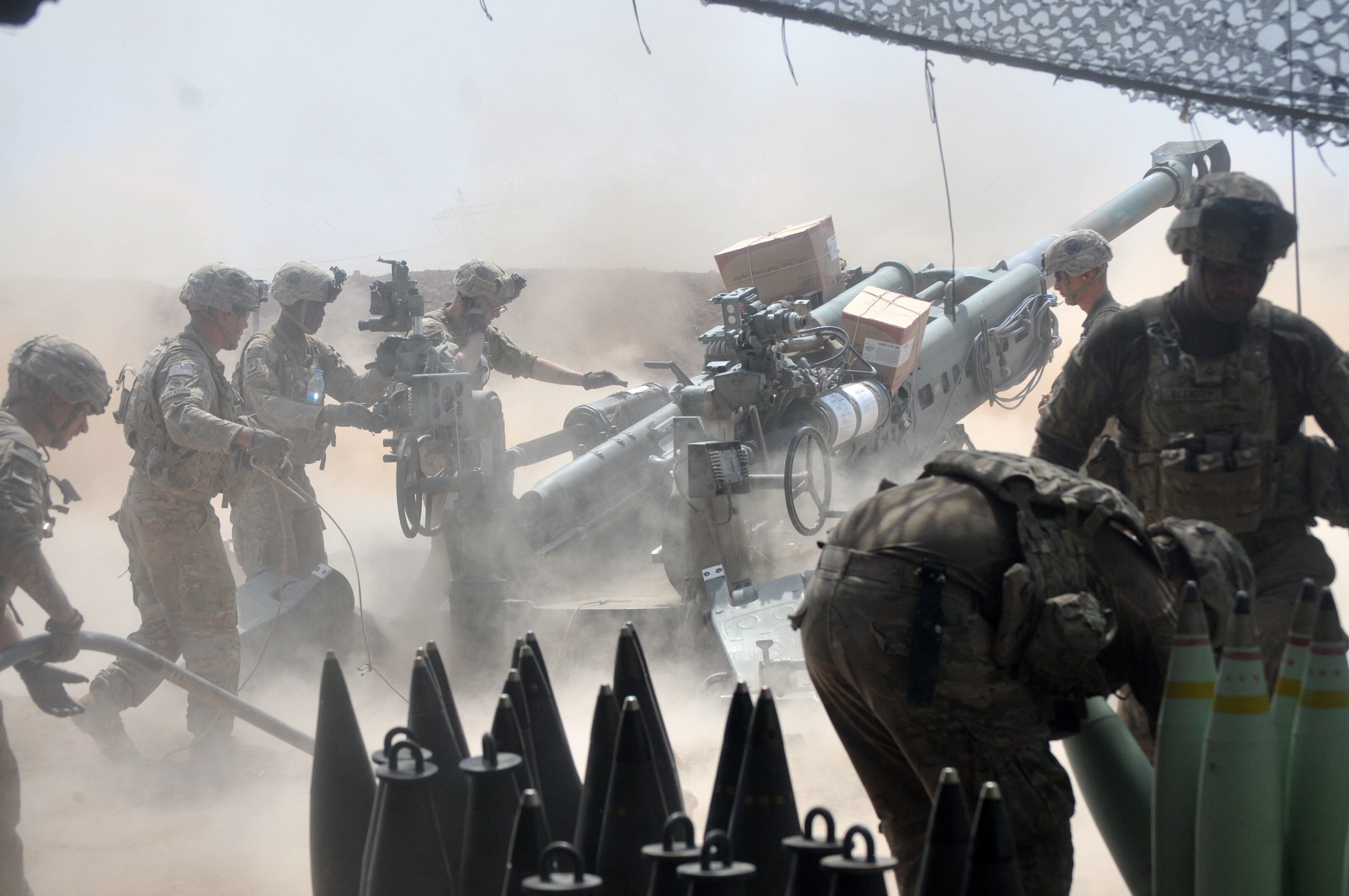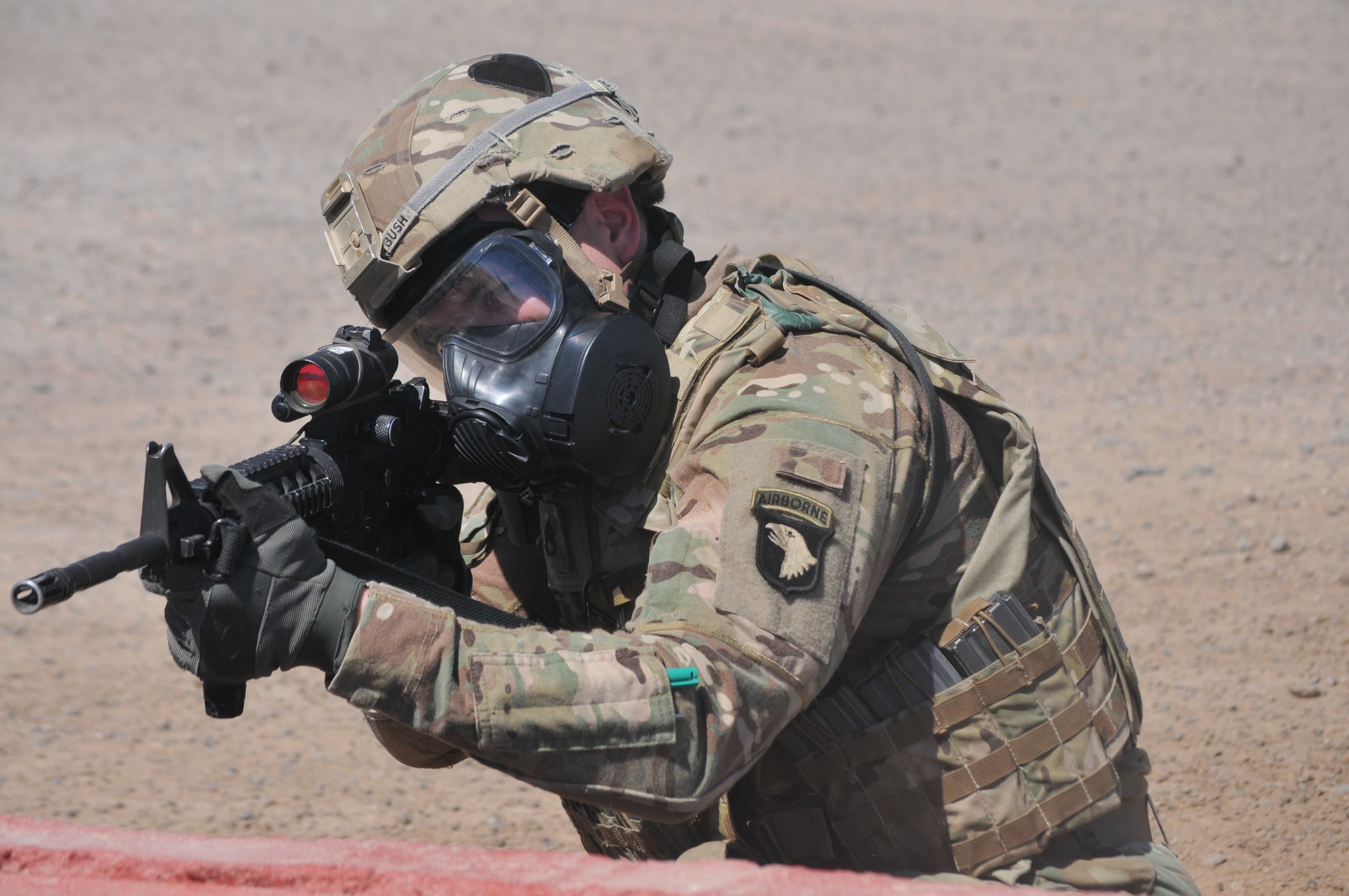The Iraqi Security Forces are preparing for a tough fight as they look to take back Mosul from the Islamic State terror group, but the work won’t stop there, a top Army general said.
"Everybody’s focused on Mosul," said Maj. Gen. Gary Volesky, commanding general of the 101st Airborne Division and commander of Combined Joint Forces Land Component Command-Iraq. "The enemy is a lot weaker than they have been, they’re not able to do a lot of things offensively, so the Iraqis clearly see there’s an opportunity to put pressure on the enemy."
But as U.S. and coalition troops continue to work alongside the Iraqis to prepare them for this major operation, officials aren’t taking the enemy for granted.
"We do know they’ve been in Mosul a few years, so the fight will get harder as they get closer to Mosul," Volesky said. "This is the crown jewel of Iraq. We know there’s going to be a fight there."
And the fight against the Islamic State, or Daesh, as they’re referred to by troops deployed to Iraq, won’t be over after the Mosul offensive, Volesky said.
"Daesh isn’t going to be defeated when Mosul is over," he said. "They’re still in Tal Afar, the desert, there’s still a lot of terrain in Iraq that needs to be liberated."
At the same time, the enemy also is transitioning to insurgency and terrorism tactics, Volesky said, citing as an example the massive car bomb attack in Baghdad’s Karada district that killed more than 100 people in July.
"This is what we saw in 2004, 2006, and on, this insurgency," he said. "So we’re working the training to make sure the [Iraqi] units are getting the right training."
This includes providing more counter-terrorism training for units in the Euphrates River Valley, while continuing to provide more Decisive Action training to units preparing for the Mosul fight, he said.
"Those units we’ve seen who went through training, they just get better and better," he said.
Volesky and his soldiers, including a large contingent from the division’s 2nd Brigade Combat Team, said the work they’re doing with the Iraqis is paying off, but the Iraqis continue to struggle with force generation.
"The Iraqis are maintaining pressure on Daesh, [but] everybody’s in the fight," Volesky said. "If you pull somebody who’s in the fight, you have to replace them. We don’t want them to continue to move north then someplace in the Euphrates River Valley falls and Baghdad is threatened."
The Iraqis must be able to hold key areas while disrupting the enemy and pushing toward Mosul "without having to worry about things further south, near Baghdad," he said.
U.S. and coalition advisors and trainers also continue to work with the Iraqis on sustainment and planning for critical capabilities such as medical, aviation and fires, Volesky said.
"We work to enable them, to integrate into their plan," he said. "We want to participate in rehearsals with them so we can better plan and get a better sense of their timing."
American and coalition troops continue to build on the relationships they’ve formed with their Iraqi counterparts, Volesky said.
"We were here for 10 years. A lot of these people we’re dealing with we’ve had relationships with before, so they know what we bring to the fight," he said.
For the 1,700 soldiers from 2nd BCT, 101st Airborne, they are focused on advising and assisting their Iraqi counterparts in 10 locations across Iraq and three in Kuwait, said Col. Brett Sylvia, the brigade commander.
"Everywhere there is an American flag flying, there’s a Strike soldier there," Sylvia said, using the brigade’s moniker.
The brigade, which has its headquarters at Camp Swift, about 90 minutes from Irbil, has a three-fold mission, Sylvia said.
First, they advise their Iraqi counterparts, mostly at the brigade level and higher.
His soldiers also assist the Iraqis by providing precision fires across Iraq from Kara Soar Base, formerly known as Firebase Bell.
Their third mission is to protect, Sylvia said.
"Those are guys that are out there that secure bases as part of the security force, some type of reaction force, in order to be able to support the forces we have that are out there," he said.
For many of his soldiers, this deployment marks a shift from previous combat tours, Sylvia said.
"In previous deployments, we were either firmly in the lead or we were shoulder-to-shoulder with our counterparts executing combat operations," he said. "We were out there on the ground, we had great situational awareness, we had great control over what’s going on on the battlefield."
This time, his soldiers are not on the battlefield, Sylvia said.
The Iraqis "are the tip of the spear and we are behind, providing our best advice and providing over-the-shoulder kinetic fires to support their offensive maneuvers," he said. "In the past, we may have wanted victory more than our counterparts did, but there’s no way that’s happening now because they’re the ones out there. I think that is a better place for us today in terms of getting their full buy-in and ownership."

Soldiers with Battery C, 1st Battalion, 320th Field Artillery Regiment, Task Force Strike, begin the process to load another round in their M777 artillery piece in northern Iraq, Aug. 15, 2016, during an operation to support the Iraqi army.
Photo Credit: 1st Lt. Daniel Johnson/US Army
In the four months since his soldiers have been Iraq, they have already seen the Iraqis’ confidence grow, Sylvia said. As an example, early in the tour, the Iraqis would defer to the U.S. when there was an opportunity to use artillery, Sylvia said.
"Through the work our teams have done and the processes they’ve been able to work on, they’re now starting to have greater confidence in their own equipment and their own capabilities," he said. "Now, we plan out the synchronization of all our assets, our assets with their assets, to ensure we have a plan in order to make the most of the assets that are available. That is how we’ve seen our advisory efforts bear some fruit here."
Soldiers from 2nd BCT are focused on the upcoming battle in Mosul, Sylvia said.
"We came here with one goal for this BCT, and that was to get the Iraqis to Mosul," he said. "That’s what we’re focused on, doing everything we can, every single day, to help our Iraqi and Kurdish counterparts liberate Mosul. Their ability to do that takes away the center of gravity for Daesh in Iraq. It’s something we believe is achievable and we want to see during our watch."
Sylvia cautioned that the fight won’t be easy.
"Daesh has been in Mosul for two years. We do anticipate the closer we get to Mosul, the harder the fight is going to be," he said. "But [the Iraqis] have grown in confidence and competence, and that confidence will take them a long way."

Staff Sgt. Christopher Bush, with 1st Battalion, 26th Infantry Regiment, Task Force Strike, provides security during a base defense drill at Camp Taji, Iraq, July 23, 2016. This drill is one way Coalition forces maintain readiness and practice security procedures.
Photo Credit: 1st Lt. Daniel Johnson/US Army
As he looks ahead to Mosul and beyond, Daesh is losing, Volesky said.
"They’re flat-out losing, and they know it," he said. "If you listen to [Abu Bakr al-Baghdadi], their leader, he came out a month ago on social media and said, ‘Hey, United States, you think this is a great victory for you because Iraqis have liberated villages, but we’re going to go back out to the desert and wait and bide our time.’ That’s a guy who knows he’s losing."
Compare that to 2014, Volesky said, when al-Baghdadi stood in the mosque in Mosul and proclaimed it "the great caliphate."
"He’s not talking that anymore," he said. "The senior leader of this organization is, frankly, acknowledging they’re being beat, and that doesn’t bode too well for his fighters."
Volesky acknowledged that it’s difficult for the American people to truly see an end to the fight.
"From a military perspective, if you look at how much terrain Daesh seized in 2014, and you look now, 50 percent of what they seized is no longer theirs, and they’re losing terrain every single day," he said. "They were driving tanks and had huge formations and were seizing terrain. They’re running now. A year ago, they were rolling in huge numbers downs through Iraq. They’re not doing that anymore."
But the military alone can’t solve this problem, Volesky said.
"This isn’t just going to be a military solution," he said. "We’ve said we can’t want this more than [the Iraqis] do because that won’t bring lasting change. And now, they’re the ones at the tip of the spear. That’s what’s different."
Volesky said he’s proud of the work his soldiers are doing.
"They all realize we’ve got a chance to help the Iraqis do something epic, and that’s get them to Mosul," he said. "We’re motivated to try to take the fight to them."
Michelle Tan is the editor of Army Times and Air Force Times. She has covered the military for Military Times since 2005, and has embedded with U.S. troops in Iraq, Afghanistan, Kuwait, Haiti, Gabon and the Horn of Africa.





